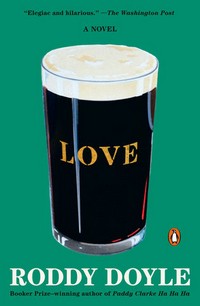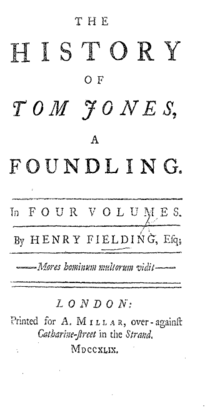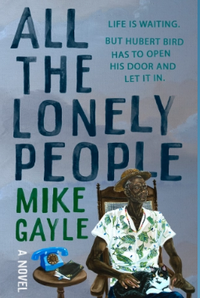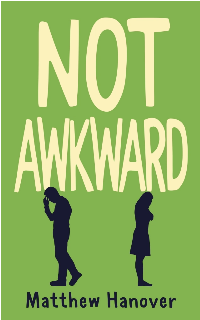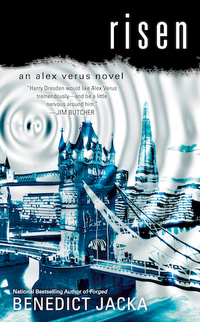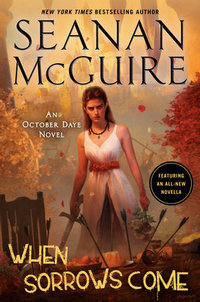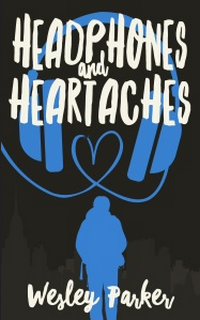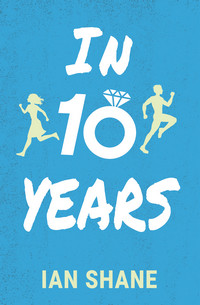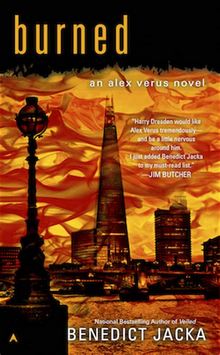
As far as most people were concerned, I was one of the bad | guys, and I wasn’t sure they were wrong. The part that really bothered me was that, when I looked back on the decisions that had brought me here, all of them had made sense at the time. There hadn’t been a moment where I’d had a clear choice between good and evil. I’d just had to choose between bad options, over and over again, and things had kept getting worse.
Was there a point at which it had all gone wrong?
This last year, I’ve been listening to the audiobooks to review the series before this. And it’s been a lot of fun. Up until that chapter at about the midpoint in Fallen that really could’ve served as a series finale. Even knowing it was coming, it was a gut-punch. And the book and a half that followed made it clear that a lot was going to happen in this last book, and very little of it promised to be good.
Also, in a real sense, even though I think the story needed to end, it was coming to that point naturally—I really didn’t want to leave this world and these characters.
This brings us to:
What’s Risen About?
It’s time for the final face-off between Alex and his allies (a new, temporary, one is introduced early on here), the Council, Richard Drakh, and Anne and her forces. If Anne (okay, the djinn who controls her) succeeds in their plans, a new, devastating war will break out, and mages throughout the world will be killed in large numbers (and humans will fare much worse). So, the others call a truce to face this threat together.
Naturally, everyone expects the others to betray them as soon as is possible—but in the meantime, they need to work together (the Council solicits Alex’s help in taking Richard out as soon as feasible). Alex goes along with the truce—and the Council’s offer—because it’s the only way to prevent the worst-case scenario and he wants one more shot at saving Anne. Something that Richard and the Council couldn’t care less about.
That’s pretty much what the novel is about—a fight for all the marbles. At the very least, the future of magic society in the U.K. hangs in the balance. At the most, the future of life on Earth will be determined by this confrontation.
Oh, and Alex is pretty sure he only has a few days left to live (not that he’s told anyone this), so he needs to get a move on to save the day, and possibly Anne.
That Meme Moment
You’ve likely seen that meme with photos of Bert from Sesame Street, reading that says, “When a character’s death is so sudden and unexpected that you have to re-read it a few times…” (see also that death from Harry Potter and the Order of the Phoenix). Well, there was one of those, here. You knew X was in a jeopardy-filled situation—everyone in the novel is—you knew all along that there’d be character deaths.
But…wow. “____ killed ____” and that’s it. No fight, no dialogue, no description of it, just “____ killed ____”. I don’t know how many times I reread it, just hoping for more detail, hoping what I read was actually “it looked like ____ killed ____.” I was in shock for a bit. Alex and others were, too (when the danger passed).
As I said, you knew from the beginning (or from the two previous novels) that every character was at risk, but those three words really drove that home.
No one is safe in Risen. No. One.
I absolutely love it, and I’m glad I don’t interact with Jacka online because I won’t have to pretend to be nice to him for the next few weeks while I process things.
The State of Alex
“Are you going to help?”
“And if I say no?”
“I would prefer that you didn’t.”
“Prefer,” Helikaon said cynically. “What happened to that nice mild-mannered apprentice I used to have?”
“Turns out he was never all that nice.”
Helikaon grunted. “Took you long enough to figure that out.”
The novel opens with a pretty big fight scene—bigger than a reader of the first few novels might expect—and Alex is going through enemies like a super-powered action hero. Sure, he’s powered up a lot lately, but it was just so strange to see that. He’s not the character we met in Fated anymore.
Is that a good thing?
That’s the central question of Risen (arguably for the series itself). For years, Alex has insisted he’s not a Dark Mage when the whole world assumed he was one. Sure, he was definitely not a Light Mage but he consistently refused to align himself with the Dark Mages. Alex saw himself as an embodiment of Henley’s Invictus. But when then he was forced into office as a Dark Mage and then when the Light Council turned on him one too many times…he started acting like one. He never really embraced the identity, but he might as well have.
But beyond the title, he really started walking down a Dark Path (with the “dark” connoting the lack of morality that Dark Mage doesn’t). Compromise after compromise, choice after choice after choice—all the defenses and walls that Alex had set up so that he wouldn’t act a certain way came falling down. And maybe, just maybe, it indeed “turns out he was never all that nice”—or moral.
A lot of time is spent with Alex wrestling over this in Risen. Often enough—and in terms similar enough—it might seem redundant. But when you remember how short a time frame this book’s action encompasses, it’s not surprising that he keeps mulling over things in the same terms—he never gets a chance to really resolve the question to himself until the end. Alex isn’t repeating himself, he’s continuing the inner dialogue over a couple of days—with frequent life-threatening interruptions. It’s no wonder he keeps asking the same question of himself.
In the end, for Alex, I’m not sure it matters what kind of person he was. Whether he was a moral person—or just wanted to be (at least for a while). I think the Alex Verus of Fated wouldn’t be crazy about the Alex of Risen, but he might exercise some compassion and understanding toward him (begrudgingly). But it’s the actions at the end, in the closing chapter or two, that really tell the reader (and Alex) what kind of man he was at his core.
Getting to watch him wrestle with these ideas, the moral ambiguities, and clear moral failings was a great part of this series. A character that can honestly examine himself and draw these kinds of conclusions is rare in Urban Fantasy (also, it’s not frequently called for). It’s just one of many reasons to love the series.
A Word About Luna
When we first meet Luna, she’s scared, nervous, as far from confident as is humanly possible, but in befriending Alex (and being befriended by him), she’s realized that there’s some kind of hope of a future for her. She’d never really had that (or if she did, it was so long ago, she’d forgotten it). He pulled her out of her shell, introduced her to a new world, and guided and protected her through it.
She probably ended up idolizing Alex because of this—thought of him in ways he couldn’t live up to. Yes, she was aware enough of his shortcomings and human nature to keep her idea of him from being overidealized, but there was a degree of it. She seamlessly transitions from being his biggest cheerleader to being his conscience. As always, they talk through plans, he assumes (as he should) her assistance in his schemes—but through their planning sessions, Luna keeps calling him back to the Alex he was, reminding him of his morals and the decisions he made to ensure he wasn’t Richard, or Levistus, or any one of a number of mages he wanted to be nothing like. She wasn’t always 100% successful, she sometimes had to repeat herself. But if Alex were a cartoon character, Luna would be the figure in the white robes standing on his shoulder fighting for him to do the right thing.
Beyond being Alex’s Jiminy Cricket, Luna’s really matured. She really doesn’t need him in her life as a mentor—the Arcana Emporium is truly hers now, she’s the one doling out guidance and advice. Luna’s able to stand on her own now—and it’s great to see. Alex might be the central character of this series, but Luna’s the real MVP.
Along the same lines, I need to shoehorn in a comment about Landis. I’ve always liked him and meant to talk about him—this was underlined during my revisiting this year. There’s so much to appreciate about this character—I really hope he’s one we get short stories about in the future. He really shines in Risen—for his actions, as well as for those actions he deliberately doesn’t take. There’s a complexity to him that would be great to dive into.
Risen as a Series Finale
Luna tailed off, a sad look on her face. “We’ve lost so much.”
The simple way that she said it hurt. I wished I could tell her that the worst was over.
With over a hundred pages to go at that point, I wished he could tell her that, too—but no. Not even close.
Before I started reading this, I thought back to the series I’ve read over the last few years that ended (I’m not counting things like trilogies that were never supposed to keep going). Some of them ended well—like The Hollows (until Harrison’s publisher decided it needed to come back); some of them went out on a victorious note—like Kitty Norville; some of them left readers divided and uncertain—like The Iron Druid Chronicles (I change my mind about that ending regularly). I don’t think this will be as divisive as IDC (and it shouldn’t be), but it really reminded me of it.
I think Alex spends a lot of this novel (and the previous one) in a similar headspace to Atticus at the end of Scourged, a lot of what happened to him and those around him was due to choices Alex had made and he saw that—and was prepared to face the consequences (although, he’d find a way out of them or to mitigate them if possible).
But the similarities end there.
This is a great series finale—we get the confrontations we’ve been waiting for since early on. We get resolutions to every major plotline. We get answers to some big questions. There are strong indications for what life is going to look like (at least for the foreseeable future) for those we care about who make it to the end. It doesn’t feel like Jacka pulled any punches, or cheated to give someone a happier ending than the story seemed to suggest.
Everything that happened felt inevitable, like we were waiting for it, and Alex for all his divination should’ve seen it coming (I wonder if Helikaon did). In that opening quotation, he asks, “Was there a point at which it had all gone wrong?” Yeah, pretty much early on in Fated is when his fate was sealed—although it’s probably when he took on Anne and Vari in addition to Luna, when he opened himself up to them, cared about them, and shared his life and dangers with them—and adopted theirs as his. This makes it a lot like The Iron Druid Chronicles again—there’s a straight line between the choices that Atticus makes in that first book and the finale.
All this points to Jacka’s skill—unlike some people claim for their series, I don’t get the impression from what I’ve read/heard from him that he had the series mapped out like this when he started. But it sure felt like it.
Do I want to see more in this world? Of course! And the promised collection of short stories will satisfy that desire. But do I feel cheated? Do I feel like I need more? No. And much more than a few short stories will take some of the luster off of this ending. The story has been told, and as a reader I can move on knowing that’s done.
So, what did I think about Risen?
I shook my head. No easy choices, no easy answers. And now I was keeping company with generals and politicians, the sort of people who make these kinds of choices every day. Pick option one, these people die. Pick option two, it’s some other people instead. Pick option three, and both groups live, but the problem isn’t solved and will come back at some unspecified time in the future, at which point it’ll probably be worse. Make your choice, and don’t take too long, because tomorrow you’ll have to do it all over again.
Maybe this was how you turned into someone like Levistus. Having to fight for your own position while also having to decide between life and death for the people below you every single day. Over time you’d get numb to it, and eventually you’d stop feeling anything at all.
Was I becoming like that? I didn’t know. and that frightened me.
As tempting as it is to focus solely on the end of the series, I wanted to focus on Risen as a novel. It’s one of Jacka’s best. Maybe his best. Probably his best. And I say this as someone who is not a fan of all the choices he made in terms of character or plot. At least not in the moment, I think I’ve come around to them after the fact.
It really works as a novel—from the (typical) in media res opening, the challenges and deals Alex has to make to set up the main action (which takes so much more of the novel than is typical), to the main action—it’s well-paced, never too fast so you feel overwhelmed, but it never really lets up, either. There are moments of lightness to balance the darkness, thoughtfulness/reflection to balance the action.
Not having to worry about the next X many books to come, Jacka can keep things focused. It almost becomes a stand-alone at this point. The goals of the plot and Alex are clear throughout—stop Anne’s djinn’s plan, defeat Richard (hopefully once and for all), try to save Anne, and be ready for the fateweaver to kill Alex.
I wasn’t sure where to put this observation, but I needed to say something about this. After the last chapter—with its very definitive “The End”—there’s an Epilogue. But before that epilogue are a few pages with just a little text each. It’s a brilliant move, and I’d give the book another star if I could just for it. They make the Epilogue the literary equivalent of an MCU mid/post-credits scene, and I didn’t think such a thing would be possible or would work, but it did. Those pages also give the reader a minute to process the impact of that final scene before diving into the Epilogue, and you really need that.
There are great action scenes, some great character moments (many, actually), and fans will find themselves fist-pumping quite often. There are so many powerful scenes. In a few months, I’m going to listen to this audiobook. And I already know a few passages where Jackson’s narration is going to hurt to listen to—mostly ones I went back and re-read and I could hear his narration in my head as I did so.
I want to keep going, I don’t know how to shut up about this, in case you can’t tell. But I think I’ve said all the important things, and probably several of the less-important things. It’s almost like when I hit “Schedule,” I’ll really be done with the series, so if I can keep typing I don’t have to say goodbye.
I’m going to miss Alex and the crew—but I’m glad I got to see it go out this way. And you know, when the promised collection of short stories is out, I’ll be jumping on it. If you’ve read this far, you’ve probably read the whole series and don’t need me to tell you to read it—you already have, or are just waiting with bated breath to do so. If you’ve read this far and haven’t read the series? For cryin’ out loud, fix that.

This post contains an affiliate link. If you purchase from it, I will get a small commission at no additional cost to you. As always, opinions are my own.

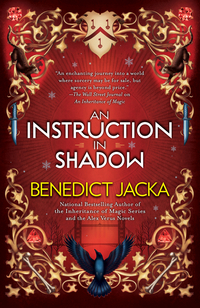 An Instruction in Shadow
An Instruction in Shadow

![]()



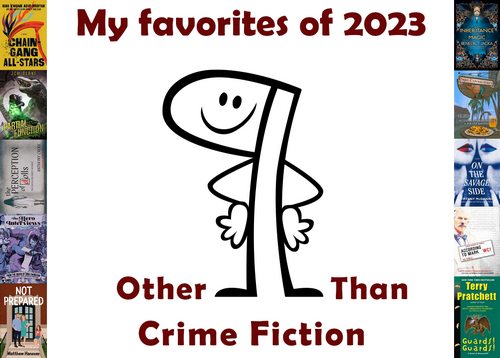
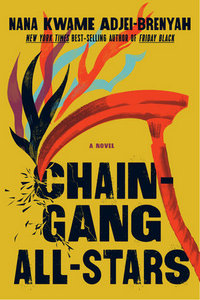

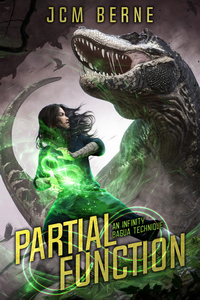

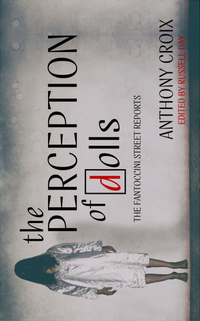

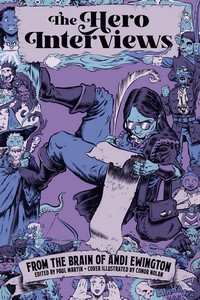

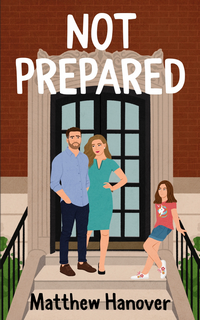
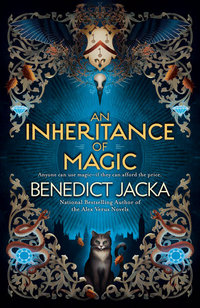
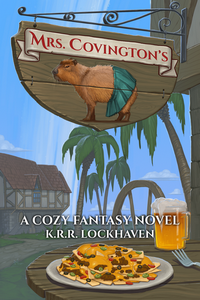
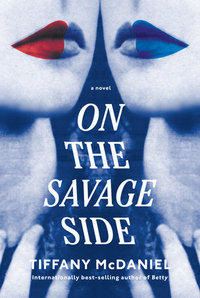
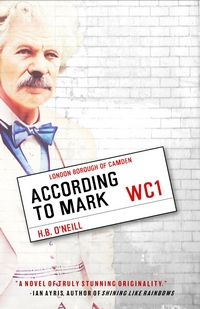
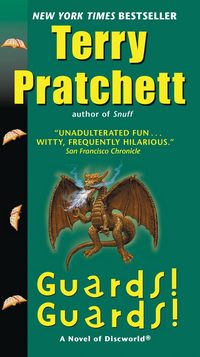

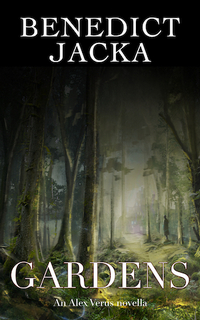

 Grab a book, any book.
Grab a book, any book.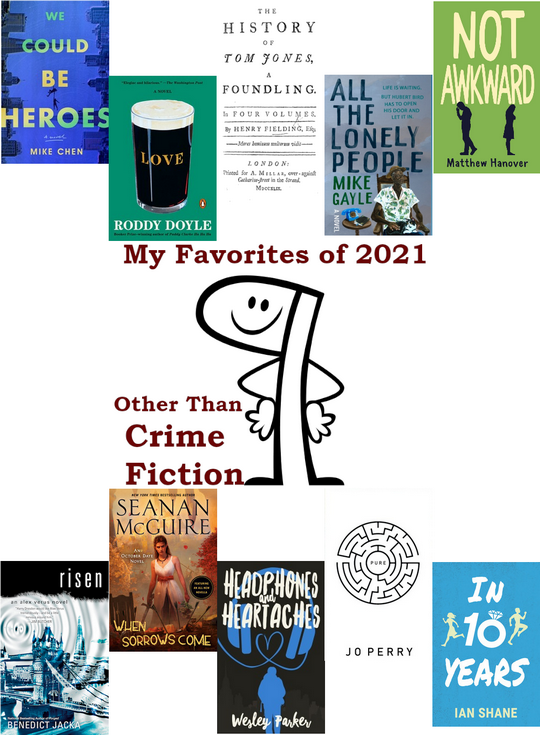
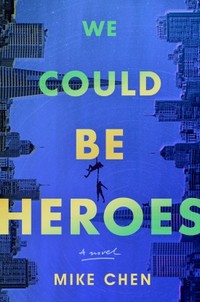
 In typical Chen fashion, the SF/super-hero elements are just an excuse to tell a story about friendship, memory, and identity. It’s a story about people, who just happen to be super-powered.
In typical Chen fashion, the SF/super-hero elements are just an excuse to tell a story about friendship, memory, and identity. It’s a story about people, who just happen to be super-powered.